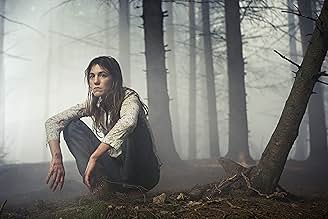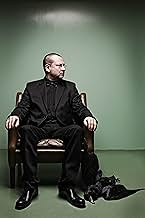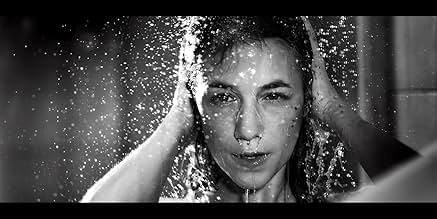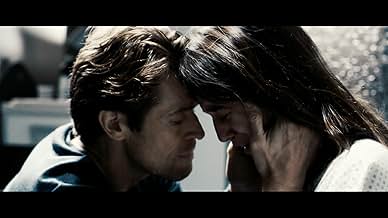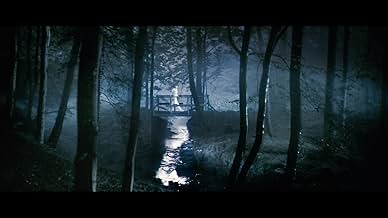Antichrist
- 2009
- 16 avec avertissement
- 1h 48min
Un couple en deuil se retire à leur cabane dans les bois, espérant de réparer leurs coeurs brisés et mariage en difficulté, mais la nature suit son cours et les choses s'empirent.Un couple en deuil se retire à leur cabane dans les bois, espérant de réparer leurs coeurs brisés et mariage en difficulté, mais la nature suit son cours et les choses s'empirent.Un couple en deuil se retire à leur cabane dans les bois, espérant de réparer leurs coeurs brisés et mariage en difficulté, mais la nature suit son cours et les choses s'empirent.
- Réalisation
- Scénario
- Casting principal
- Réalisation
- Scénario
- Casting principal
- Récompenses
- 21 victoires et 33 nominations au total
Avis à la une
10theisbj
This movie drained me...
Without a doubt the most unpleasant and despairing movie I've ever watched. It's not just the graphic imagery that got to me, but the overall tone of the movie was incredibly dreadful and you could almost feel a presence of some sort of "evil".
This is a hard movie to review. It crosses all barriers when it comes to movie making...ALL. It makes you question yourself about what art is and if there's anything as going "too far"?
But don't dismiss this. It's certainly much more than just being graphic for the sake of it. First off, the cinematography is absolutely flawless. The opening scene had me in absolute awe. Beautiful... And my deepest respect to Willem Dafoe and Charlotte Gainsburg. I could only imagine how much this would drain the actors both mentally and physically. They are amazing and deserve Oscars.
I have to mention the violence too, since it's a critical aspect. This isn't "torture porn" of any kind. It's natural (it's looks almost too realistic), physical sexual violence. That's why it works so effective on the audience. You can almost feel their pain. Never before have I watched a movie where I felt the urge to look away. You would think that, in the end, all this violence and self molestation is just a shock tactic, but I assure you it's not. There is actually a plot and a sensible progression of the movie. I of course won't say too much. People need to see it.
I can understand why some people wouldn't like it, and that's okay. This is most definitely not for everyone.
It may not be a movie that made me feel good, but it made feel something and had an effect on me. It's beautiful, sad, poetic, horrific and in the end, oddly uplifting. A genre masterpiece.
A must see.
10/10.
Without a doubt the most unpleasant and despairing movie I've ever watched. It's not just the graphic imagery that got to me, but the overall tone of the movie was incredibly dreadful and you could almost feel a presence of some sort of "evil".
This is a hard movie to review. It crosses all barriers when it comes to movie making...ALL. It makes you question yourself about what art is and if there's anything as going "too far"?
But don't dismiss this. It's certainly much more than just being graphic for the sake of it. First off, the cinematography is absolutely flawless. The opening scene had me in absolute awe. Beautiful... And my deepest respect to Willem Dafoe and Charlotte Gainsburg. I could only imagine how much this would drain the actors both mentally and physically. They are amazing and deserve Oscars.
I have to mention the violence too, since it's a critical aspect. This isn't "torture porn" of any kind. It's natural (it's looks almost too realistic), physical sexual violence. That's why it works so effective on the audience. You can almost feel their pain. Never before have I watched a movie where I felt the urge to look away. You would think that, in the end, all this violence and self molestation is just a shock tactic, but I assure you it's not. There is actually a plot and a sensible progression of the movie. I of course won't say too much. People need to see it.
I can understand why some people wouldn't like it, and that's okay. This is most definitely not for everyone.
It may not be a movie that made me feel good, but it made feel something and had an effect on me. It's beautiful, sad, poetic, horrific and in the end, oddly uplifting. A genre masterpiece.
A must see.
10/10.
Much as I hate to see personal heroes go down, this was a letdown in every way.
I'm betting that just about everything filmed in slo-mo, black&white & set to a classical tune is likely to seem wonderful. It's such a cheap trick! How can people say that the prologue is wonderful/brilliant etc, when it's a mere legerdemain of the lowest kind? I mean, get together a cute baby, a washing machine and a couple having explicit sex, and you have not a brilliant scene, but a brainless, comfortable attempt at stirring emotion. Bah.
In fact, the entire movie suffers from a lack of creativity: the ominous atmosphere is suggested by heavy fog (I mean fog machines), a fox speaks (everybody burst out laughing, no wonder!), a crow refuses to die despite being hit over the head repeatedly. How much must we suffer for von Trier's shortage of original artistic vision!
As for the rest, a friend explained it had to do with seeing women as intrinsically threatening because of their sexual drive. I recommend Odishon for that - more intelligent, less cheap.
I'm betting that just about everything filmed in slo-mo, black&white & set to a classical tune is likely to seem wonderful. It's such a cheap trick! How can people say that the prologue is wonderful/brilliant etc, when it's a mere legerdemain of the lowest kind? I mean, get together a cute baby, a washing machine and a couple having explicit sex, and you have not a brilliant scene, but a brainless, comfortable attempt at stirring emotion. Bah.
In fact, the entire movie suffers from a lack of creativity: the ominous atmosphere is suggested by heavy fog (I mean fog machines), a fox speaks (everybody burst out laughing, no wonder!), a crow refuses to die despite being hit over the head repeatedly. How much must we suffer for von Trier's shortage of original artistic vision!
As for the rest, a friend explained it had to do with seeing women as intrinsically threatening because of their sexual drive. I recommend Odishon for that - more intelligent, less cheap.
Lars Von Trier is a director who's always been going his own ways, and this can definitely be seen in this movie. Antichrist is a movie that doesn't hold anything back when it comes to gore, and the stuff that you see in the film won't leave your mind the next couple of days. But the movie itself is much more than that... The movie is beautifully shot, the story and setting extremely uncomfortable and the acting is fantastic. The movie is sometime painful to watch, not in a "Saw" or "Hostel" kind of way, but when you leave the theater you feel genuinely uncomfortable, and that is one of the reasons why i liked this movie. It's a movie like nothing i've experienced and I'm glad that we have directors like Lars Von Trier that dares to make a film like this. It's nothing like the mainstream movies that are being made nowadays, and it makes your mind race when you leave the theater, something very few movies does. You aren't served with facts, as with any other movies, but are left to interpret and think for yourself. It's a bizarre movie and not one for the faint of heart, but if you dare to be provoked and see a movie like nothing you've ever seen, then go see Antichrist.
Down the road from me is a coven of Christian filmmakers. It is a school and the purpose is to make films that evangelize. This fascinates me; generally their stories are about fighting the devil, a narrative that encompasses both what is in the film and what surrounds the making of the film. Some day, they might make engaging films and who knows what will happen.
This interests me because most movies are made by professional storytellers. Scorcese and Fincher (for example) not only makes a wide variety of stories, but they deliberately do so. The connection with their lives is — with few exceptions — with the art. Most singers are this way as well. Connected with this is films that have a love story that features a woman the male filmmaker is in love with. This often grabs me.
Now here we have a man deeply depressed, possessed. He makes a film painfully pulled from his soul, so difficult in the making that he is suicidal. It works. It is so deeply disturbing that I caution you to stay away from it. I was a bit vulnerable when encountering this world and it affected me.
Lars von Trier has built a life making films that exploit experiments in convention. I find them interesting, but there is always an academic distance that keeps them from connecting. They engage for how they are made, not what they are. At each juncture, I wonder how powerful a film might be if he used what he knows to communicate, rather than to practice. Now I know. He was so depressed he simply made. Looking at the usual areas where he is disciplined, you can see he is sloppy. Everything is imprecise. There is no theory at work here. Where it is technically competent, it is only temporarily so. That is what makes it so, so very powerful. His gush of expression floods past his constraints of Danish discipline.
The story is identical to "Don't Look Now." We as viewers think we see a child lost, and follow a couple in a grief that swallows them. But we see it from the husband's untrusted eye. He is confused, haunted, magically twisted through the sexual magic he and we see but which permeates and guides the narrative. This is a tornado of witchcraft, like the Roeg film, but from a filmmaker within it. Causal mechanics are not what we think we know from the beginning. The shoes are reversed. I do not know from outside sources what caused his depression, but it is pretty clear from this desperate message from within.
There are some pretty powerful images here. Some involve genitals, an ordinarily off-limits zone. Some involve a graceful death of an infant, made more terrifying by the beauty in which we receive it. Some involve damaged animals. Each of these is amplified by the rush of emotional confusion, the onanistic waterfall of acorns on the tin roof. Experience this at your peril.
The actors are incredible.
Ted's Evaluation -- 3 of 3: Worth watching.
This interests me because most movies are made by professional storytellers. Scorcese and Fincher (for example) not only makes a wide variety of stories, but they deliberately do so. The connection with their lives is — with few exceptions — with the art. Most singers are this way as well. Connected with this is films that have a love story that features a woman the male filmmaker is in love with. This often grabs me.
Now here we have a man deeply depressed, possessed. He makes a film painfully pulled from his soul, so difficult in the making that he is suicidal. It works. It is so deeply disturbing that I caution you to stay away from it. I was a bit vulnerable when encountering this world and it affected me.
Lars von Trier has built a life making films that exploit experiments in convention. I find them interesting, but there is always an academic distance that keeps them from connecting. They engage for how they are made, not what they are. At each juncture, I wonder how powerful a film might be if he used what he knows to communicate, rather than to practice. Now I know. He was so depressed he simply made. Looking at the usual areas where he is disciplined, you can see he is sloppy. Everything is imprecise. There is no theory at work here. Where it is technically competent, it is only temporarily so. That is what makes it so, so very powerful. His gush of expression floods past his constraints of Danish discipline.
The story is identical to "Don't Look Now." We as viewers think we see a child lost, and follow a couple in a grief that swallows them. But we see it from the husband's untrusted eye. He is confused, haunted, magically twisted through the sexual magic he and we see but which permeates and guides the narrative. This is a tornado of witchcraft, like the Roeg film, but from a filmmaker within it. Causal mechanics are not what we think we know from the beginning. The shoes are reversed. I do not know from outside sources what caused his depression, but it is pretty clear from this desperate message from within.
There are some pretty powerful images here. Some involve genitals, an ordinarily off-limits zone. Some involve a graceful death of an infant, made more terrifying by the beauty in which we receive it. Some involve damaged animals. Each of these is amplified by the rush of emotional confusion, the onanistic waterfall of acorns on the tin roof. Experience this at your peril.
The actors are incredible.
Ted's Evaluation -- 3 of 3: Worth watching.
An eerie yet gorgeous tapestry of lingering close-ups; parallels, cuts and slow-motion photography, Lars Von Trier's Antichrist is a gruelling tale of mythical grandeur: a bizarre yet beautiful film chock full of sadism and shagging, Satanic dogma and similes. Most of which, I don't understand. So you'll be pleased to know that I have no intention of harping on about the director's bent meditation on gender, nature, genocide, motherhood, misogyny and astronomy. I find all that stuff interesting, don't get me wrong, but when things get Freudian I'm way out of my league. Therefore, I'll stick to what I know.
Albeit seething with emotion, Antichrist refuses to adhere to some of the general "rules" of the classical Hollywood narrative, meaning it lacks clarity, unity and closure. For example, there're only two characters, both of which remain nameless and have indefinite; pasts, motives and are somewhat difficult to identify with. The film rejects conventional morality. It is a difficult and uncomfortable experience that'll unnerve even the most robust of film fans. So if you like your films light, clear and conservative, stay away. If, however, you're a fan of, say, Nicholas Roeg's Don't Look Now, director David Lynch or you just dig a bit of alternative cinema, then brace yourself for a hugely demanding tableau that film critic Anita Singh of the Sunday Telegraph dubbed "the most shocking film in the history of the Cannes Film Festival." Willem Dafoe plays "he", a therapist and husband to "she" (Charlotte Gainsbourg), the female half of the cast whose line of work we never really learn. After a quite miraculous opening montage that juxtaposes the couple making love with the accidental death of their child, the embedded tale follows the pair as they flee to "Eden", their isolated cabin in the woods, where "he" attempts to aid a severely grief stricken "she" through her bereavement.
Book-ended by a masterfully conceived prologue and epilogue and split into four focal chapters entitled "Grief", "Pain", "Despair" and "The Three Beggars" (don't ask), the film takes on a ghostlike tone from the outset as the boundaries between the real and surreal become blurred. Alas, things get weird, edgy and very, very nasty. The sheer mass and rate of dense motifs and metaphors at hand regarding sex, Freud, the devil and the soul is a little overwhelming. Not to mention the force and intensity of both Dafoe and Gainsbourg's turns in addition to the film's strong, emotional undercurrent.
In spite of large and sustained periods of quite brilliant film-making, Antichrist contains some of the most violent and deplorable images ever committed to celluloid. For the ladies there's self mutilation. For the gents there's I, I, I can't even say it. Put it this way, it ain't good lads Anyway, add to the unthinkable gore a whole host of outlandish set-ups, half a dozen scenes of a sexual nature and one or two jolts in tone and you'll be scared silly. Remember- sometimes in cinema, you fear what you don't understand, especially when the camera is an unflinching eye inside the head of a disturbed, Danish poet. Lars Von Trier is an excellent filmmaker, but even his biggest fans will find it hard to swallow this, never mind stomach it.
Dedicated to the memory of legendary soviet filmmaker Andrei Tarkovsky, Antichrist is truly as haunting, delicate and poetic a film as you're ever bound to see. Though shrouded in scenes of unspeakable cruelty, the film eludes to the work of Tarkovsky in a big way: Von Trier's warped Adam and Eve parable is a moody, metaphysical affair cloaked in hypnotic, dreamlike imagery that calls to mind the likes of Mirror, Solaris and the brilliant Stalker. The trancelike photography; sound, score, and editing demonstrate a predilection for atmospheric, art-theatre sensibility. Tarkovsky would have loved it. This, after all, is a film that simply has to be seen to be believed. Not necessarily for its aesthetic grandeur, gore or technique, but for its harrowing portrayal of a soul in torment.
What's it all about? Who cares?! Antichrist is an unusual, atmospheric horror film that's guaranteed to provoke. The performances are honest and strong, the aesthetics are bold, the direction is brilliant and the outcome is something that is ultimately hard to come by these days: authentic film-making.
Jack Harding
Albeit seething with emotion, Antichrist refuses to adhere to some of the general "rules" of the classical Hollywood narrative, meaning it lacks clarity, unity and closure. For example, there're only two characters, both of which remain nameless and have indefinite; pasts, motives and are somewhat difficult to identify with. The film rejects conventional morality. It is a difficult and uncomfortable experience that'll unnerve even the most robust of film fans. So if you like your films light, clear and conservative, stay away. If, however, you're a fan of, say, Nicholas Roeg's Don't Look Now, director David Lynch or you just dig a bit of alternative cinema, then brace yourself for a hugely demanding tableau that film critic Anita Singh of the Sunday Telegraph dubbed "the most shocking film in the history of the Cannes Film Festival." Willem Dafoe plays "he", a therapist and husband to "she" (Charlotte Gainsbourg), the female half of the cast whose line of work we never really learn. After a quite miraculous opening montage that juxtaposes the couple making love with the accidental death of their child, the embedded tale follows the pair as they flee to "Eden", their isolated cabin in the woods, where "he" attempts to aid a severely grief stricken "she" through her bereavement.
Book-ended by a masterfully conceived prologue and epilogue and split into four focal chapters entitled "Grief", "Pain", "Despair" and "The Three Beggars" (don't ask), the film takes on a ghostlike tone from the outset as the boundaries between the real and surreal become blurred. Alas, things get weird, edgy and very, very nasty. The sheer mass and rate of dense motifs and metaphors at hand regarding sex, Freud, the devil and the soul is a little overwhelming. Not to mention the force and intensity of both Dafoe and Gainsbourg's turns in addition to the film's strong, emotional undercurrent.
In spite of large and sustained periods of quite brilliant film-making, Antichrist contains some of the most violent and deplorable images ever committed to celluloid. For the ladies there's self mutilation. For the gents there's I, I, I can't even say it. Put it this way, it ain't good lads Anyway, add to the unthinkable gore a whole host of outlandish set-ups, half a dozen scenes of a sexual nature and one or two jolts in tone and you'll be scared silly. Remember- sometimes in cinema, you fear what you don't understand, especially when the camera is an unflinching eye inside the head of a disturbed, Danish poet. Lars Von Trier is an excellent filmmaker, but even his biggest fans will find it hard to swallow this, never mind stomach it.
Dedicated to the memory of legendary soviet filmmaker Andrei Tarkovsky, Antichrist is truly as haunting, delicate and poetic a film as you're ever bound to see. Though shrouded in scenes of unspeakable cruelty, the film eludes to the work of Tarkovsky in a big way: Von Trier's warped Adam and Eve parable is a moody, metaphysical affair cloaked in hypnotic, dreamlike imagery that calls to mind the likes of Mirror, Solaris and the brilliant Stalker. The trancelike photography; sound, score, and editing demonstrate a predilection for atmospheric, art-theatre sensibility. Tarkovsky would have loved it. This, after all, is a film that simply has to be seen to be believed. Not necessarily for its aesthetic grandeur, gore or technique, but for its harrowing portrayal of a soul in torment.
What's it all about? Who cares?! Antichrist is an unusual, atmospheric horror film that's guaranteed to provoke. The performances are honest and strong, the aesthetics are bold, the direction is brilliant and the outcome is something that is ultimately hard to come by these days: authentic film-making.
Jack Harding
Le saviez-vous
- AnecdotesThe Sound Engineer actually swallowed a microphone and recorded the inner audio of his body in order to achieve certain similar sounds for the film.
- GaffesDuring the prologue, there is shot of a foot knock over a bottle from the far end of the bed. In a later shot, the same bottle is rolling on the bedside as He and She have sex.
- Citations
Fox: Chaos reigns.
- ConnexionsFeatured in At the Movies: Cannes Film Festival 2009 (2009)
- Bandes originales'Lascia ch'io pianga' from 'Rinaldo'
Composed by George Frideric Handel (as Georg Friedrich Händel)
Performed by Tuva Semmingsen and Barokksolistene
Meilleurs choix
Connectez-vous pour évaluer et suivre la liste de favoris afin de recevoir des recommandations personnalisées
- How long is Antichrist?Alimenté par Alexa
- Is "Antichrist" based on a book?
- What is the meaning of the animals?
Détails
Box-office
- Budget
- 11 000 000 $US (estimé)
- Montant brut aux États-Unis et au Canada
- 404 122 $US
- Week-end de sortie aux États-Unis et au Canada
- 71 397 $US
- 25 oct. 2009
- Montant brut mondial
- 7 426 651 $US
- Durée1 heure 48 minutes
- Couleur
- Mixage
- Rapport de forme
- 2.35 : 1
Contribuer à cette page
Suggérer une modification ou ajouter du contenu manquant





